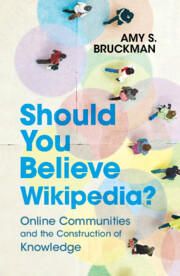Book contents
- Should You Believe Wikipedia?
- Should You Believe Wikipedia?
- Copyright page
- Dedication
- Contents
- Acknowledgments
- Introduction Design and Social Behavior
- 1 Are Online “Communities” Really Communities?
- 2 What Can Online Collaboration Accomplish?
- 3 Should You Believe Wikipedia?
- 4 How Does the Internet Change How We Think?
- 5 How Do People Express Identity Online, and Why Is This Important for Online Interaction?
- 6 What Is Bad Online Behavior, and What Can We Do About It?
- 7 How Do Business Models Shape Online Communities?
- 8 How Can We Help the Internet to Bring Out the Best in Us All?
- References
- Index
2 - What Can Online Collaboration Accomplish?
Published online by Cambridge University Press: 13 January 2022
- Should You Believe Wikipedia?
- Should You Believe Wikipedia?
- Copyright page
- Dedication
- Contents
- Acknowledgments
- Introduction Design and Social Behavior
- 1 Are Online “Communities” Really Communities?
- 2 What Can Online Collaboration Accomplish?
- 3 Should You Believe Wikipedia?
- 4 How Does the Internet Change How We Think?
- 5 How Do People Express Identity Online, and Why Is This Important for Online Interaction?
- 6 What Is Bad Online Behavior, and What Can We Do About It?
- 7 How Do Business Models Shape Online Communities?
- 8 How Can We Help the Internet to Bring Out the Best in Us All?
- References
- Index
Summary
Introduces some powerful examples of constructive uses of online collaboration—like Wikipedia and citizen science. Why do people spend hundreds of volunteer hours writing encyclopedia articles or counting birds? The chapter explains the incentive structure in peer production, and what kinds of things are possible using peer production methods, explores citizen science in some detail, and introduces Yochai Benkler’s theory of why peer production is important, and what factors are important for a peer production project to succeed.
- Type
- Chapter
- Information
- Should You Believe Wikipedia?Online Communities and the Construction of Knowledge, pp. 32 - 63Publisher: Cambridge University PressPrint publication year: 2022

